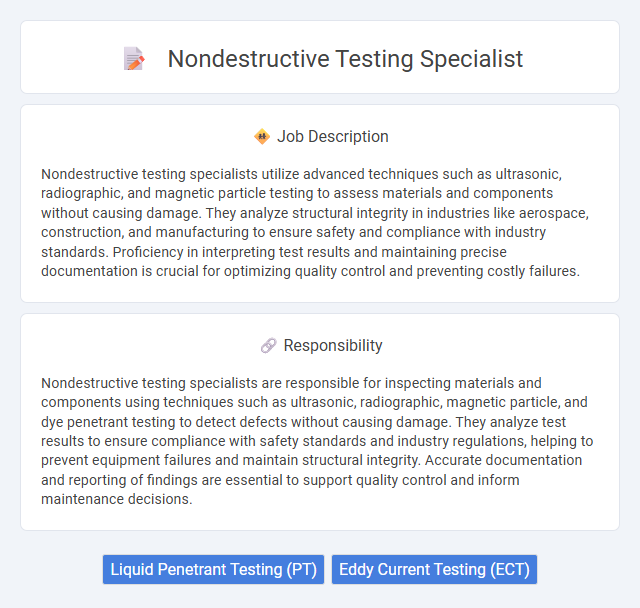
Nondestructive testing specialists utilize advanced techniques such as ultrasonic, radiographic, and magnetic particle testing to assess materials and components without causing damage. They analyze structural integrity in industries like aerospace, construction, and manufacturing to ensure safety and compliance with industry standards. Proficiency in interpreting test results and maintaining precise documentation is crucial for optimizing quality control and preventing costly failures.
Individuals with strong analytical skills and a meticulous attention to detail are more likely to thrive as nondestructive testing specialists. People who remain calm under pressure and can work independently in challenging environments may suit this profession better. Those with physical endurance and good hand-eye coordination could have a higher probability of success in performing the precision tasks required.
Qualification
Nondestructive testing specialists typically require a bachelor's degree in engineering, materials science, or a related field, along with certification from recognized bodies such as ASNT (American Society for Nondestructive Testing). Proficiency in various NDT methods, including ultrasonic, radiographic, magnetic particle, and dye penetrant testing, is essential to accurately assess material integrity without causing damage. Strong analytical skills and attention to detail ensure precise identification of flaws and compliance with industry safety standards.
Responsibility
Nondestructive testing specialists are responsible for inspecting materials and components using techniques such as ultrasonic, radiographic, magnetic particle, and dye penetrant testing to detect defects without causing damage. They analyze test results to ensure compliance with safety standards and industry regulations, helping to prevent equipment failures and maintain structural integrity. Accurate documentation and reporting of findings are essential to support quality control and inform maintenance decisions.
Benefit
Nondestructive testing specialists likely enjoy the benefit of ensuring safety and reliability without damaging materials, which can lead to cost savings for companies. Their expertise probably increases demand in industries such as aerospace, manufacturing, and construction, potentially offering job stability and career growth. The role may also provide opportunities to work with advanced technology, enhancing technical skills and professional development.
Challenge
Nondestructive testing specialists likely face challenging situations where they must identify hidden flaws without damaging materials or structures. The precision required in interpreting complex data could pose ongoing difficulties in ensuring safety and compliance standards. Tackling unpredictable defects may demand continuous learning and adaptation in advanced testing technologies.
Career Advancement
Nondestructive testing specialists advance their careers by gaining certifications such as ASNT Level II or Level III, which enhance their expertise in methods like ultrasonic, radiographic, and magnetic particle testing. Experience with cutting-edge technologies and proficiency in data analysis enable specialists to move into roles like quality assurance manager or inspection supervisor. Continuous professional development and cross-industry knowledge increase opportunities for leadership positions in sectors such as aerospace, oil and gas, and manufacturing.
Key Terms
Liquid Penetrant Testing (PT)
Nondestructive testing specialists in Liquid Penetrant Testing (PT) expertly detect surface defects in materials using fluorescent or visible dye penetrants, ensuring the integrity of critical components in aerospace, automotive, and manufacturing industries. They skillfully apply penetrants, control dwell times, and perform meticulous inspections under ultraviolet or white light to identify cracks, porosity, and other surface discontinuities without damaging the test object. Mastery of PT standards such as ASTM E165 and ASME Section V enables these specialists to deliver precise, reliable inspections that uphold safety and quality compliance.
Eddy Current Testing (ECT)
A Nondestructive Testing (NDT) specialist skilled in Eddy Current Testing (ECT) plays a critical role in detecting surface and near-surface defects in conductive materials without causing damage. Proficiency in using ECT equipment to assess corrosion, cracks, and material thickness ensures the integrity and safety of aerospace, automotive, and manufacturing components. Expertise in interpreting complex eddy current signals enhances fault detection accuracy, supporting compliance with industry standards such as ASTM and ISO.
 kuljobs.com
kuljobs.com